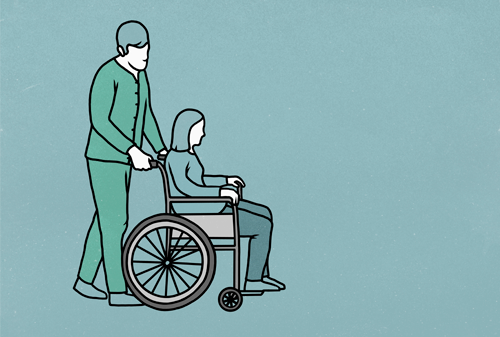




Ways of working in health and social care settings are described in an organisation’s written policies and procedures, and in records such as care and support plans that have been agreed by all concerned and that allow needs to be met more flexibly. They are based on legislation, standards and professional body codes of practice. Workers are required to follow these ways of working to promote and maintain the health, safety and well-being of everyone in the workplace.
Ensuring that individuals are properly cared for when they access health and social care services requires the application of legislation, standards and codes of conduct and professional practice. This ensures individuals are given the best possible service.
The Code of Professional Practice for Social Care describes the standards of professional conduct and practice required of health and social care workers in Wales. The Code plays a key part in raising awareness of these standards. The Code promotes the values that underpin social care and support and seeks to embed them within working practice.
Individuals who access services, carers and family members need to know about the Code. The provision of safe care and support is everyone’s responsibility, not just health and social care workers and it is important that individuals in Wales know what to expect of social care worker.
Caiff ffyrdd o weithio mewn lleoliadau iechyd a gofal cymdeithasol eu disgrifio fel rhan o bolisïau a gweithdrefnau ysgrifenedig sefydliad, megis cynlluniau gofal a chymorth, ac mewn cofnodion y cytunwyd arnynt gan bawb dan sylw ac sy'n golygu y gellir diwallu anghenion mewn ffordd fwy hyblyg. Maent yn seiliedig ar ddeddfwriaeth, safonau a chodau ymarfer cyrff proffesiynol. Mae'n ofynnol i weithwyr ddilyn y ffyrdd hyn o weithio er mwyn hyrwyddo a chynnal iechyd, diogelwch a llesiant pawb yn y gweithle.
Er mwyn sicrhau bod unigolion yn cael gofal priodol pan fyddant yn defnyddio gwasanaethau iechyd a gofal cymdeithasol, mae angen cymhwyso deddfwriaeth, safonau a chodau ymddygiad ac ymarfer proffesiynol. Mae hyn yn sicrhau bod unigolion yn cael y gwasanaeth gorau posibl.
Mae'r Cod Ymarfer Proffesiynol ar gyfer Gofal Cymdeithasol yn disgrifio'r safonau ymddygiad a'r ymarfer proffesiynol sy'n ofynnol gan weithwyr iechyd a gofal cymdeithasol yng Nghymru. Mae'r Cod yn chwarae rhan allweddol wrth godi ymwybyddiaeth o'r safonau hyn. Mae'r Cod yn hyrwyddo'r gwerthoedd sy'n sail i ofal a chymorth cymdeithasol ac yn ceisio eu cynnwys o fewn ymarfer gweithio.
Mae angen i unigolion sy'n defnyddio gwasanaethau, eu gofalwyr ac aelodau o'u teuluoedd wybod am y Cod. Mae cyfrifoldeb ar bawb i ddarparu gofal a chymorth diogel, nid dim ond gweithwyr iechyd a gofal cymdeithasol ac mae'n bwysig bod unigolion yng Nghymru yn gwybod beth i'w ddisgwyl gan weithwyr gofal cymdeithasol.
Watch the video about The Code of Professional Practice for Social Care
Gwyliwch y fideo am y Cod Ymarfer Proffesiynol Gofal Cymdeithasol
Hint 2: Lorem ipsum dolor sit amet, consectetur adipisicing elit. Modi est praesentium earum exercitationem, accusantium molestiae asperiores reiciendis aliquam doloribus, delectus, cumque odio omnis rem, aliquid et. Quisquam eius, incidunt ab.
Awgrymiadau 2: Lorem ipsum dolor sit amet, consectetur adipisicing elit. Modi est praesentium earum exercitationem, accusantium molestiae asperiores reiciendis aliquam doloribus, delectus, cumque odio omnis rem, aliquid et. Quisquam eius, incidunt ab.

Healthcare support workers provide a valuable and important contribution to the delivery of healthcare services. The NHS Wales Code of Conduct for Healthcare Support Workers in Wales describes the standards of conduct, behaviour and attitude required of all healthcare support workers employed within NHS Wales.
The Code applies to all healthcare support workers employed in clinical and non-clinical settings within the NHS and is used in job descriptions. The Code of Practice for NHS Wales' employers is an important quality assurance process, supporting the employment, training and monitoring of healthcare support workers in Wales.
http://www.wales.nhs.uk/nhswalescodeofconductandcodeofpractice
Mae gweithwyr cymorth gofal iechyd yn gwneud cyfraniad gwerthfawr a phwysig i'r broses o ddarparu gwasanaethau gofal iechyd. Mae Cod Ymddygiad GIG Cymru ar gyfer gweithwyr cymorth gofal iechyd yng Nghymru yn disgrifio'r safonau ymddygiad, yr ymddygiad a'r agwedd sy'n ofynnol gan bob gweithiwr cymorth gofal iechyd a gyflogir o fewn GIG Cymru.
Mae'r Cod yn berthnasol i bob gweithiwr cymorth gofal iechyd a gyflogir mewn lleoliadau clinigol ac anghlinigol ac fe'i defnyddir mewn disgrifiadau swydd. Mae'r Cod Ymarfer i gyflogwyr GIG Cymru yn broses sicrhau ansawdd bwysig, sy'n helpu wrth gyflogi, hyfforddi a monitro gweithwyr cymorth gofal iechyd yng Nghymru.
Hint 3: Lorem ipsum dolor sit amet, consectetur adipisicing elit. Modi est praesentium earum exercitationem, accusantium molestiae asperiores reiciendis aliquam doloribus, delectus, cumque odio omnis rem, aliquid et. Quisquam eius, incidunt ab.
Awgrymiadau 3: Lorem ipsum dolor sit amet, consectetur adipisicing elit. Modi est praesentium earum exercitationem, accusantium molestiae asperiores reiciendis aliquam doloribus, delectus, cumque odio omnis rem, aliquid et. Quisquam eius, incidunt ab.

The limits, or a requirement, of an individual's job role is made up of the different tasks or activities that need to be carried out to get a job done. It is like a contract in that it defines what they have to do, how they should do it, with whom, where, in what circumstances and by when. Because it also includes details about what they are aiming to achieve, it is used to judge an individual's performance, so the more well defined it is, the better their chance of doing a job well.
The role and responsibilities of an individual's job should also clarify what they must not do. This could include activities which they have not yet been trained for, and tasks that they are not capable of doing because of an individual's health status or lack of experience for example.
They should also state activities that an individual's age, sex and understanding prevents them from carrying out, such as helping someone of the opposite sex with intimate care needs. Working in ways that are clearly defined like this puts the health, safety and emotional well-being of everyone at risk.
As the scope of an individual's job role is used to measure their performance, it is important that they discuss with their manager what is expected of them. Observation or informal supervision helps their supervisor to identify their strengths and limitations and chat with them about their performance.
Mae cyfyngiadau, neu ofynion, swydd unigolyn yn cynnwys y gwahanol dasgau neu weithgareddau y mae angen eu cyflawni er mwyn gwneud y gwaith. Maent yn debyg i gontract, yn yr ystyr eu bod yn diffinio beth y mae'n rhaid iddynt ei wneud, sut y dylent ei wneud, gyda phwy, ble, o dan ba amgylchiadau ac erbyn pryd. Gan eu bod hefyd yn cynnwys manylion am yr hyn y mae'n anelu at ei gyflawni, fe'u defnyddir i farnu perfformiad yr unigolyn, felly po fwyaf penodol ydynt, y mwyaf tebygol y bydd o wneud y gwaith yn dda.
Dylai rolau a chyfrifoldebau swydd unigolyn hefyd egluro beth na ddylai ei wneud. Gallai hyn gynnwys gweithgareddau nad yw wedi'i hyfforddi ar eu cyfer eto, a thasgau na all eu cyflawni oherwydd statws iechyd neu ddiffyg profiad yr unigolyn, er enghraifft.
Dylent hefyd nodi gweithgareddau y mae oedran, rhyw a dealltwriaeth yr unigolyn yn ei atal rhag eu cyflawni, megis helpu rhywun o'r rhyw arall ag anghenion gofal personol. Mae gweithio mewn ffyrdd sydd wedi'u diffinio'n glir yn rhoi iechyd, diogelwch a lles emosiynol pawb yn y fantol.
Gan y defnyddir cwmpas rôl swydd unigolyn i fesur ei berfformiad, mae'n bwysig iddo drafod yr hyn a ddisgwylir ganddo gyda'i reolwr. Mae sesiynau arsylwi neu oruchwylio anffurfiol yn helpu ei oruchwylydd i nodi ei gryfderau a'i gyfyngiadau ac i sgwrsio am ei berfformiad.
Hint 4: Lorem ipsum dolor sit amet, consectetur adipisicing elit. Modi est praesentium earum exercitationem, accusantium molestiae asperiores reiciendis aliquam doloribus, delectus, cumque odio omnis rem, aliquid et. Quisquam eius, incidunt ab.
Awgrymiadau 4: Lorem ipsum dolor sit amet, consectetur adipisicing elit. Modi est praesentium earum exercitationem, accusantium molestiae asperiores reiciendis aliquam doloribus, delectus, cumque odio omnis rem, aliquid et. Quisquam eius, incidunt ab.

Workplace policies explain the arrangements that a workplace has for complying with legislation. For example, in order to comply with the Health and Safety (First Aid) Regulations, every workplace should have a policy that describes how it manages first aid. Procedures describe the ways of working that need to be followed for policies to be implemented. They record who does what, when and how in order to maintain health, safety and well-being at all times. For example, first aid procedures describe the roles of first aiders, the individuals responsible for maintaining first-aid equipment and facilities, when and how to call the emergency services and when and how to complete an accident report form.
Most workplace procedures are extremely rigid and prescriptive, but because individual needs and capabilities and the environments in which needs are met are so diverse, some procedures have to be more flexible. For example, fire evacuation procedures will differ according to where individuals live, a purpose-built residential care home will be equipped with fire doors and fire-fighting equipment, but a family home in which an individual's grandmother wants to live out her remaining days will not be the same. A purpose-built residential care home will be equipped with hoists and stair lifts, whereas an individual's grandmother’s house may not have room for moving and handling equipment. In such situations, ways of working have to be devised and agreed by everyone involved.
Workplace policies, procedures and agreed ways of working are usually stored centrally, where they are accessible to everyone who might need to know their content. They must be updated regularly in response to, for example, changes in legislation or technological advances.
Mae polisïau'r gweithle yn esbonio'r trefniadau sydd ar waith gan weithle er mwyn cydymffurfio â deddfwriaeth. Er enghraifft, er mwyn cydymffurfio â'r Rheoliadau Iechyd a Diogelwch (Cymorth Cyntaf), dylai fod gan bob gweithle bolisi sy'n disgrifio ei drefniadau ar gyfer rheoli cymorth cyntaf. Mae gweithdrefnau yn disgrifio'r ffyrdd o weithio y mae angen eu dilyn er mwyn rhoi polisïau ar waith. Maent yn cofnodi pwy sy'n gwneud beth, pryd a sut er mwyn sicrhau iechyd, diogelwch a lles ar bob adeg. Er enghraifft, mae gweithdrefnau cymorth cyntaf yn disgrifio rolau swyddogion cymorth cyntaf, yr unigolion sy'n gyfrifol am gynnal a chadw cyfarpar a chyfleusterau cymorth cyntaf, pryd a sut i ffonio'r gwasanaethau brys a phryd a sut i gwblhau ffurflen cofnodi damweiniau.
Mae'r rhan fwyaf o weithdrefnau mewn gweithleoedd yn gaeth iawn ac yn rhagnodol, ond gan fod anghenion a galluoedd unigolion a'r amgylcheddau lle y caiff yr anghenion eu diwallu mor amrywiol, mae'n rhaid i rai gweithdrefnau fod yn fwy hyblyg. Er enghraifft, bydd gweithdrefnau ar gyfer gwagio'r adeilad os bydd tân yn amrywio yn ôl ble y mae unigolion yn byw. Bydd gan gartref gofal preswyl pwrpasol ddrysau tân a chyfarpar diffodd tân, ond ni fydd gan gartref teuluol lle y mae mam-gu unigolyn wedi dewis treulio ei diwrnodau olaf gyfleusterau o'r fath. Bydd cyfarpar codi a lifftiau grisiau ar gael mewn cartref gofal preswyl pwrpasol, ond mae'n bosibl na fydd lle ar gyfer cyfarpar codi a chario yn nhŷ mam-gu unigolyn. Mewn sefyllfaoedd o'r fath, rhaid llunio ffyrdd o weithio a rhaid i bawb sy'n rhan o'r broses gytuno arnynt.
Fel arfer, bydd gweithleoedd yn storio polisïau, gweithdrefnau a ffyrdd o weithio y cytunwyd arnynt mewn man canolog, lle y byddant yn hygyrch i bawb y gallai fod angen iddynt weld eu cynnwys. Rhaid eu diweddaru'n rheolaidd, er enghraifft, mewn ymateb i newidiadau mewn deddfwriaeth neu ddatblygiadau technolegol.
Hint 5: Lorem ipsum dolor sit amet, consectetur adipisicing elit. Modi est praesentium earum exercitationem, accusantium molestiae asperiores reiciendis aliquam doloribus, delectus, cumque odio omnis rem, aliquid et. Quisquam eius, incidunt ab.
Awgrymiadau 5: Lorem ipsum dolor sit amet, consectetur adipisicing elit. Modi est praesentium earum exercitationem, accusantium molestiae asperiores reiciendis aliquam doloribus, delectus, cumque odio omnis rem, aliquid et. Quisquam eius, incidunt ab.

All workplaces have policies, procedures and agreed ways of working in place to ensure that work practice, meets the requirements of legislation. Because health and social care settings vary in the type of work they do, their procedures and agreed ways of working will also vary. However, in general, health and social care settings have policies, procedures and agreed ways of working that cover:
It is a legal requirement that an individual should follow policies, procedures and agreed ways of working to the letter. They promote and maintain safe work practice, and failure to follow them puts the health, safety and well-being of everyone concerned at risk. It could also mean the loss of an individual employer’s reputation as a well-regarded service provider and the end of their career in health and social care.
Mae gan bob gweithle bolisïau, gweithdrefnau a ffyrdd o weithio y cytunwyd arnynt ar waith er mwyn sicrhau bod arferion gwaith yn bodloni gofynion deddfwriaeth. Gan fod lleoliadau iechyd a gofal cymdeithasol yn amrywio o ran y math o waith a wneir, bydd eu gweithdrefnau a'u ffyrdd o weithio y cytunwyd arnynt hefyd yn amrywio. Fodd bynnag, yn gyffredinol, bydd gan leoliadau iechyd a gofal cymdeithasol bolisïau, gweithdrefnau a ffyrdd o weithio y cytunwyd arnynt sy'n ymdrin â'r canlynol:
Mae'n ofyniad cyfreithiol i unigolyn ddilyn polisïau, gweithdrefnau a ffyrdd o weithio y cytunwyd arnynt yn fanwl. Maent yn hyrwyddo ac yn sicrhau ymarfer gwaith diogel, ac mae methu â'u dilyn yn rhoi iechyd, diogelwch a lles pawb dan sylw yn y fantol. Gallai hefyd gael effaith andwyol ar enw da cyflogwr unigol fel darparwr gwasanaeth uchel ei barch a diwedd ei yrfa ym maes iechyd a gofal cymdeithasol.
Hint 6: Lorem ipsum dolor sit amet, consectetur adipisicing elit. Modi est praesentium earum exercitationem, accusantium molestiae asperiores reiciendis aliquam doloribus, delectus, cumque odio omnis rem, aliquid et. Quisquam eius, incidunt ab.
Awgrymiadau 6: Lorem ipsum dolor sit amet, consectetur adipisicing elit. Modi est praesentium earum exercitationem, accusantium molestiae asperiores reiciendis aliquam doloribus, delectus, cumque odio omnis rem, aliquid et. Quisquam eius, incidunt ab.

Duty of care is the requirement to exercise a level of care towards an individual to avoid injury to that individual or their property. It is based on the relationship of the different parties, the negligent act or omission and the reasonable likelihood of loss to that individual.
Health and social care professionals have a duty of care to ensure the safety and well-being of individuals they are supporting. Most professions have set out good practice guidelines, and not following these guidelines may amount to abuse or neglect. All health and social care professions have identified certain principles and ways of working as ‘good practice’. Being aware of what ‘good practice’ means can help an individual identify abuse or neglect.
For example, an individual could notice that even though their colleague is wearing gloves, they use the same pair throughout their shift and don't wash their hands between tasks. They prepare breakfast, deliver personal care, and write in the hand-over book without taking the gloves off. This is putting the safety of individuals at risk and a health and social care professional has a professional duty to raise their concerns about this.
Ystyr dyletswydd gofal yw'r gofyniad i arddel lefel o ofal tuag at unigolyn er mwyn osgoi anaf i'r unigolyn hwnnw neu ddifrod i'w eiddo. Mae'n seiliedig ar y gydberthynas rhwng y gwahanol bartïon, y weithred esgeulus neu'r diffyg gweithredu a'r tebygolrwydd rhesymol y bydd yr unigolyn hwnnw yn dioddef colled.
Mae gan weithwyr proffesiynol iechyd a gofal cymdeithasol ddyletswydd gofal i sicrhau diogelwch a llesiant unigolion maen nhw'n eu cynorthwyo. Mae'r rhan fwyaf o broffesiynau wedi amlinellu canllawiau ymarfer da, a gallai peidio â dilyn y canllawiau hyn fod yn gyfystyr â chamdriniaeth neu esgeulustod. Mae pob proffesiwn iechyd a gofal cymdeithasol wedi adnabod egwyddorion penodol a ffyrdd o weithio fel ‘ymarfer da’. Mae bod yn ymwybodol o beth mae ‘ymarfer da’ yn ei olygu yn gallu helpu unigolyn i adnabod camdriniaeth neu esgeulustod.
Er enghraifft, gallai unigolyn sylwi er bod ei gydweithiwr yn gwisgo menig, mae'n defnyddio'r un pâr trwy gydol ei sifft a ddim yn golchi'i ddwylo rhwng tasgau. Mae'n paratoi brecwast, darparu gofal personol, ac ysgrifennu yn y llyfr trosglwyddo heb dynnu'r menig i ffwrdd. Mae hyn yn rhoi diogelwch unigolion mewn perygl ac mae gan weithiwr iechyd a gofal cymdeithasol proffesiynol ddyletswydd proffesiynol i leisio eu pryderon am hyn.
Hint 7: Lorem ipsum dolor sit amet, consectetur adipisicing elit. Modi est praesentium earum exercitationem, accusantium molestiae asperiores reiciendis aliquam doloribus, delectus, cumque odio omnis rem, aliquid et. Quisquam eius, incidunt ab.
Awgrymiadau 7: Lorem ipsum dolor sit amet, consectetur adipisicing elit. Modi est praesentium earum exercitationem, accusantium molestiae asperiores reiciendis aliquam doloribus, delectus, cumque odio omnis rem, aliquid et. Quisquam eius, incidunt ab.

Poor or unsafe practice takes place whenever workers do not provide a good standard of care and support. It occurs when workers ignore the rights of individuals, do not give them the opportunity to make choices or participate in daily living activities or ignore agreed and safe ways of working. Poor or unsafe practice which is allowed to continue can cause harm and therefore must be viewed as abuse.
It is everyone’s role to work in ways which respect individuals and ensures their safety at all times. Workers must report any poor or unsafe practice to their senior or manager. If the practice continues, workers should report their concerns to a more senior manager. Workers can also report their concerns directly to the local authority Adult Safeguarding team, or to the inspectorate.
Mae ymarfer gwael neu anniogel yn digwydd pryd bynnag nad yw gweithwyr yn darparu safon da o ofal a chymorth. Mae'n digwydd pan mae gweithwyr yn anwybyddu hawliau unigolion, dim yn rhoi'r cyfle iddynt wneud dewisiadau neu gymryd rhan mewn gweithgareddau byw dyddiol neu anwybyddu ffyrdd cytunedig a diogel o weithio. Gall ymarfer gwael neu anniogel sy'n cael ei ganiatâu i barhau achosi niwed ac felly gellir ei ystyried yn gamdriniaeth.
Mae'n rôl i bawb weithio mewn ffyrdd sy'n parchu unigolion a sicrhau eu diogelwch ar bob adeg. Mae'n rhaid i weithwyr adrodd am unrhyw ymarfer gwael neu anniogel i'w swyddog uwch neu reolwr. Os yw'r ymarfer yn parhau dylai gweithwyr adrodd eu pryderon i reolwr uwch. Mae gweithwyr hefyd yn gallu adrodd eu pryderon yn uniongyrchol i dîm Diogelu Oedolion yr awdurdod lleol, neu i'r arolygiaeth.
Hint 8: Lorem ipsum dolor sit amet, consectetur adipisicing elit. Modi est praesentium earum exercitationem, accusantium molestiae asperiores reiciendis aliquam doloribus, delectus, cumque odio omnis rem, aliquid et. Quisquam eius, incidunt ab.
Awgrymiadau 8: Lorem ipsum dolor sit amet, consectetur adipisicing elit. Modi est praesentium earum exercitationem, accusantium molestiae asperiores reiciendis aliquam doloribus, delectus, cumque odio omnis rem, aliquid et. Quisquam eius, incidunt ab.

Duty of care is the requirement to exercise a level of care towards an individual to avoid injury to that individual or their property. It is based on the relationship of the different parties, the negligent act or omission and the reasonable likelihood of loss to that individual.
A duty of care will usually exist where the worker has some professional or work responsibility for delivering a service to an individual. A breach would have taken place when a negligent act or omission to act resulted in harm to that individual and the harm was foreseeable.
A health and social care worker owes a duty of care to the individuals they support, their colleagues, their employer, themselves and the public interest. Everyone has a duty of care and it is not something that they can opt out of.
A health and social care worker’s duty of care means that they must aim to provide high quality care to the best of their ability and say if there are any reasons why they may be unable to do so.
Ystyr dyletswydd gofal yw'r gofyniad i arddel lefel o ofal tuag at unigolyn er mwyn osgoi anaf i'r unigolyn hwnnw neu ddifrod i'w eiddo. Mae'n seiliedig ar y gydberthynas rhwng y gwahanol bartïon, y weithred esgeulus neu'r diffyg gweithredu a'r tebygolrwydd rhesymol y bydd yr unigolyn hwnnw yn dioddef colled.
Fel arfer, ceir dyletswydd gofal pan fydd gan y gweithiwr ryw fath o gyfrifoldeb proffesiynol neu waith i ddarparu gwasanaeth i unigolyn. Byddai tor-dyletswydd yn digwydd pe byddai gweithred esgeulus neu ddiffyg gweithred yn arwain at niwed i'r unigolyn hwnnw ac y gellid bod wedi rhagweld y niwed hwnnw.
Mae gan weithwyr iechyd a gofal cymdeithasol ddyletswydd gofal tuag at yr unigolion y maent yn rhoi cymorth iddynt, eu cydweithwyr, eu cyflogwr, eu hunain ac er budd y cyhoedd. Mae gan bawb ddyletswydd gofal ac nid yw'n rhywbeth y gellir dewis peidio â'i dderbyn.
Mae dyletswydd gofal gweithwyr iechyd a gofal cymdeithasol yn golygu bod yn rhaid iddynt anelu at ddarparu gofal o ansawdd uchel hyd eithaf eu gallu a bod yn rhaid iddynt ddatgan os oes unrhyw resymau pam na fyddant o bosibl yn gallu gwneud hynny.
Hint 9: Lorem ipsum dolor sit amet, consectetur adipisicing elit. Modi est praesentium earum exercitationem, accusantium molestiae asperiores reiciendis aliquam doloribus, delectus, cumque odio omnis rem, aliquid et. Quisquam eius, incidunt ab.
Awgrymiadau 9: Lorem ipsum dolor sit amet, consectetur adipisicing elit. Modi est praesentium earum exercitationem, accusantium molestiae asperiores reiciendis aliquam doloribus, delectus, cumque odio omnis rem, aliquid et. Quisquam eius, incidunt ab.
Watch the video about duty of care.
Gwyliwch y fideo am ddyletswydd gofal.
Hint 10: Lorem ipsum dolor sit amet, consectetur adipisicing elit. Modi est praesentium earum exercitationem, accusantium molestiae asperiores reiciendis aliquam doloribus, delectus, cumque odio omnis rem, aliquid et. Quisquam eius, incidunt ab.
Awgrymiadau 10: Lorem ipsum dolor sit amet, consectetur adipisicing elit. Modi est praesentium earum exercitationem, accusantium molestiae asperiores reiciendis aliquam doloribus, delectus, cumque odio omnis rem, aliquid et. Quisquam eius, incidunt ab.

The rights of individuals must also be considered within duty of care.
It is important that these rights are supported by making sure that all staff understand the organisation’s policies and guidelines relating to the rights of individuals, ensuring that individuals are made fully aware of the organisation’s complaints procedures. Workers should also discuss choices and preferences with individuals, ensuring that professional colleagues are made aware of an individual’s choices and preferences, so that individuals can be supported to maintain their rights and independence.
Adhering to a duty of care may involve conflicts and dilemmas in some situations. Issues related to the duty of confidentiality about individuals is just one example. A dilemma may arise which would normally require complete confidentiality, but which if not disclosed may put others at risk. This would then be a breach of the duty of care to others accessing the service. A decision to observe one duty could result in a breach of the other, and it is not always the case that one duty automatically has priority over the other. An individual may wish to ignore dietary advice, potentially causing harm to themselves, or continue to smoke against medical advice. These situations require discussion, and advice and direction should be sought either from their senior or manager.
Mae'n rhaid i hawliau unigolion hefyd gael eu hystyried o fewn dyletswydd gofal.
Mae'n bwysig fod yr hawliau hyn yn cael eu cefnogi wrth sicrhau bod yr holl staff yn deall polisïau a chanllawiau'r sefydliad mewn perthynas â hawliau'r unigolion, gan sicrhau bod unigolion yn cael eu gwneud yn gwbl ymwybodol o weithdrefnau cwynion y sefydliad. Dylai gweithwyr hefyd drafod dewisiadau gydag unigolion, gan sicrhau bod cydweithwyr proffesiynol yn cael eu gwneud yn ymwybodol o ddewisiadau unigolyn, fel bod unigolion yn gallu cael eu cefnogi i gynnal eu hawliau a'u hannibyniaeth.
Gall cydymffurfio â dyletswydd gofal arwain at wrthdaro a chyfyng-gyngor mewn rhai sefyllfaoedd. Mae materion sy'n ymwneud â'r ddyletswydd cyfrinachedd i unigolion yn un enghraifft o hyn. Gall cyfyng-gyngor godi a fyddai fel arfer yn gofyn am gyfrinachedd llwyr, ond a allai achosi risg i eraill os na chaiff ei ddatgelu. Byddai hyn wedyn yn mynd yn groes i'r ddyletswydd gofal i bobl eraill sy'n defnyddio'r gwasanaeth. Gallai penderfynu cydymffurfio ag un ddyletswydd arwain at dorri'r llall, ac nid oes gan un ddyletswydd flaenoriaeth awtomatig dros y llall bob amser. Mae'n bosibl y bydd unigolyn am anwybyddu cyngor deietegol, gan arwain o bosibl at wneud niwed iddo'i hun, neu y bydd yn dewis parhau i ysmygu yn groes i gyngor meddygol. Mae angen trafod y sefyllfaoedd hyn, a dylid gofyn am gyngor a chyfarwyddyd naill ai gan uwch weithiwr neu reolwr.
Hint 11: Lorem ipsum dolor sit amet, consectetur adipisicing elit. Modi est praesentium earum exercitationem, accusantium molestiae asperiores reiciendis aliquam doloribus, delectus, cumque odio omnis rem, aliquid et. Quisquam eius, incidunt ab.
Awgrymiadau 11: Lorem ipsum dolor sit amet, consectetur adipisicing elit. Modi est praesentium earum exercitationem, accusantium molestiae asperiores reiciendis aliquam doloribus, delectus, cumque odio omnis rem, aliquid et. Quisquam eius, incidunt ab.
Duty of candour is a statutory or legal duty to be open and honest with individuals and their families when something goes wrong that appears to have caused or could lead to significant harm in the future. It applies to all health and social care workers registered with Social Care Wales.
It is important to be open and honest if a mistake has been made, or if they see practice that they do not think is correct. This is so that lessons can be learned and individuals can be protected in the future. An individual must follow their organisation’s policy in relation to what has happened, for example, health and safety, reporting and security.
Ystyr dyletswydd gonestrwydd yw dyletswydd statudol neu gyfreithiol i fod yn agored ac yn onest ag unigolion a'u teuluoedd pan aiff rhywbeth o'i le yr ymddengys ei fod wedi achosi niwed sylweddol neu y gallai arwain at niwed sylweddol yn y dyfodol. Mae'n berthnasol i bob gweithiwr iechyd a gofal cymdeithasol sydd wedi'i gofrestru gyda Gofal Cymdeithasol Cymru.
Mae'n bwysig bod yn agored ac yn onest os bydd camgymeriad wedi'i wneud, neu os byddant yn gweld ymarfer nad yw'n ymddangos yn gywir iddynt. Drwy wneud hynny, gellir dysgu gwersi, a gellir diogelu unigolion yn y dyfodol. Rhaid i unigolyn ddilyn polisi ei sefydliad mewn perthynas â beth sydd wedi digwydd, er enghraifft, iechyd a diogelwch, cofnodi a diogelwch.
Hint 12: Lorem ipsum dolor sit amet, consectetur adipisicing elit. Modi est praesentium earum exercitationem, accusantium molestiae asperiores reiciendis aliquam doloribus, delectus, cumque odio omnis rem, aliquid et. Quisquam eius, incidunt ab.
Awgrymiadau 12: Lorem ipsum dolor sit amet, consectetur adipisicing elit. Modi est praesentium earum exercitationem, accusantium molestiae asperiores reiciendis aliquam doloribus, delectus, cumque odio omnis rem, aliquid et. Quisquam eius, incidunt ab.
Click on the link to read more about duty of candour.
https://socialcare.wales/cms_assets/file-uploads/SCW-DutyofCandour-ENG-V01.pdf
Consider how duty of candour applies to your role and your work setting.
Cliciwch ar y linc i ddarllen mwy am ddyletswydd gonestrwydd.
Ystyriwch sut mae’r ddyletswydd gonestrwydd yn berthnasol i’ch rôl ac i‘ch lleoliad gwaith.
Hint 13: Lorem ipsum dolor sit amet, consectetur adipisicing elit. Modi est praesentium earum exercitationem, accusantium molestiae asperiores reiciendis aliquam doloribus, delectus, cumque odio omnis rem, aliquid et. Quisquam eius, incidunt ab.
Awgrymiadau 13: Lorem ipsum dolor sit amet, consectetur adipisicing elit. Modi est praesentium earum exercitationem, accusantium molestiae asperiores reiciendis aliquam doloribus, delectus, cumque odio omnis rem, aliquid et. Quisquam eius, incidunt ab.

In practice this means that whatever workers do as part of their job role, they should be able to justify it as a sensible course of action. Whatever they do, they should know why they're doing it and they should have been properly trained and assessed as being competent to do it. In addition, they should be doing it as part of an agreed plan of care for the individual they are supporting.
Even though workers may be working under the supervision of a more senior member of staff who will be accountable for the overall support given by the team, the worker is still accountable for what they do as part of the team.
In their job role, they are legally accountable to individuals for any errors they make, or any procedures they fail to follow, resulting in causing them harm. Individuals are entitled to pursue the case through civil law. In very extreme cases, if an individual dies or suffered serious harm due to an error or omission, the case might be pursued through the criminal courts.
Yn ymarferol, mae hyn yn golygu beth bynnag mae’r gweithwyr yn ei wneud fel rhan o’u gwaith, y dylent allu ei gyfiawnhau fel ffordd synhwyrol o weithredu. Beth bynnag y byddant yn ei wneud, dylent wybod pam eu bod yn ei wneud a dylent fod wedi cael hyfforddiant priodol ac asesiad yn dangos eu bod yn gymwys i'w wneud. Yn ogystal, dylent fod yn ei wneud fel rhan o gynllun gofal y cytunwyd arno ar gyfer yr unigolyn y maent yn ei gefnogi.
Er bod gweithwyr bob amser yn gweithio o dan oruchwyliaeth uwch aelod o staff a fydd yn atebol am y cefnogaeth cyffredinol a roddir gan y tîm, bydd y gweithiwr yn parhau'n atebol am yr hyn y byddant yn ei wneud fel rhan o'r tîm.
Yn eu swydd, maent yn gyfreithiol atebol i unigolion am unrhyw wallau y byddant yn eu gwneud, neu unrhyw weithdrefnau y byddant yn methu â'u dilyn, sy'n arwain at achosi niwed iddynt. Mae gan unigolion yr hawl i barhau â'r achos drwy gyfraith sifil. Mewn achosion eithriadol iawn, os bydd unigolyn yn marw neu'n dioddef niwed difrifol o ganlyniad i wall neu esgeulustod, gellid parhau â'r achos drwy'r llysoedd troseddol.
Hint 14: Lorem ipsum dolor sit amet, consectetur adipisicing elit. Modi est praesentium earum exercitationem, accusantium molestiae asperiores reiciendis aliquam doloribus, delectus, cumque odio omnis rem, aliquid et. Quisquam eius, incidunt ab.
Awgrymiadau 14: Lorem ipsum dolor sit amet, consectetur adipisicing elit. Modi est praesentium earum exercitationem, accusantium molestiae asperiores reiciendis aliquam doloribus, delectus, cumque odio omnis rem, aliquid et. Quisquam eius, incidunt ab.

Reflective practice is about looking back and reflecting upon an experience that has occurred during practice. It encourages reflection and thoughts about what happened, decisions that were made, actions that were taken and the consequences of those decisions and actions.
Reflective practice involves:
Reflection is important because we become more self-aware. Being self-aware allows us to have a better awareness of others and an increased sensitivity to their needs and of how we care for them. We are also able to identify weaker work practices, monitor standards and consider alternative approaches and activities in the pursuit of best practice.
Mae ymarfer myfyriol yn ymwneud ag edrych yn ôl a myfyrio ar brofiad sydd wedi digwydd yn ystod ymarfer. Mae'n annog myfyrio a meddyliau am yr hyn a ddigwyddodd, penderfyniadau a wnaed, y camau a gymerwyd a chanlyniadau'r penderfyniadau a gweithredoedd hynny.
Mae ymarfer myfyriol yn cynnwys y canlynol:
Mae myfyrio yn bwysig gan ein bod yn dod yn fwy hunanymwybodol. Mae bod yn hunanymwybodol yn arwain at well ymwybyddiaeth o eraill ac at fod yn fwy sensitif tuag at eu hanghenion a'r ffordd rydym yn gofalu amdanynt. Gallwn hefyd nodi arferion gwaith gwannach, monitro safonau ac ystyried dulliau gweithredu a gweithgareddau amgen er mwyn anelu at ymarfer gorau.
Hint 15: Lorem ipsum dolor sit amet, consectetur adipisicing elit. Modi est praesentium earum exercitationem, accusantium molestiae asperiores reiciendis aliquam doloribus, delectus, cumque odio omnis rem, aliquid et. Quisquam eius, incidunt ab.
Awgrymiadau 15: Lorem ipsum dolor sit amet, consectetur adipisicing elit. Modi est praesentium earum exercitationem, accusantium molestiae asperiores reiciendis aliquam doloribus, delectus, cumque odio omnis rem, aliquid et. Quisquam eius, incidunt ab.

Reflection is a process that involves reflecting on an individual's knowledge, understanding, attitudes, behaviour, work practice and achievements, and planning for their personal and career development. It aims to help them understand what and how they are learning, and to review, plan and take responsibility for their own development.
Reflection ensures we avoid any errors we might have made before and enables us to improve our practice and learn from areas of work we were perhaps not so good at. Changes to practice can also be included, for example amendments to moving and assisting ways of working.
Mae myfyrio yn broses sy'n cynnwys myfyrio ar wybodaeth, dealltwriaeth, agweddau, ymddygiad, arfer gwaith a chyflawniadau unigolyn, a chynllunio ar gyfer ei ddatblygiad personol ac o ran ei yrfa. Mae'n anelu at helpu'r unigolyn i ddeall beth a sut y mae'n dysgu, ac i adolygu, cynllunio a chymryd cyfrifoldeb am ei ddatblygiad ei hun.
Mae myfyrio yn sicrhau ein bod yn osgoi unrhyw wallau y gallem fod wedi'u gwneud yn flaenorol ac yn ein galluogi i wella ein hymarfer a dysgu o'r meysydd gwaith lle nad ydym o bosibl yn gweithredu cystal. Gellir cynnwys newidiadau i ymarfer hefyd, er enghraifft, diwygiadau o ran symud a hwyluso ffyrdd o weithio.
Hint 16: Lorem ipsum dolor sit amet, consectetur adipisicing elit. Modi est praesentium earum exercitationem, accusantium molestiae asperiores reiciendis aliquam doloribus, delectus, cumque odio omnis rem, aliquid et. Quisquam eius, incidunt ab.
Awgrymiadau 16: Lorem ipsum dolor sit amet, consectetur adipisicing elit. Modi est praesentium earum exercitationem, accusantium molestiae asperiores reiciendis aliquam doloribus, delectus, cumque odio omnis rem, aliquid et. Quisquam eius, incidunt ab.

Health and social care workers have access to lots of information that is confidential. This includes things such as care and support plans and health information.
In addition, we might hear things from individuals and families that are confidential.
This information should not be passed on to other people if they don’t have a need to know.
Confidential information should only be shared within the direct care team if that is expected to result in better or safer care. An individual's work setting will have policies and procedures on sharing of information, and who this information can be shared with. It is important that information is not shared with everyone when it is not meant to be.
Mae gan weithwyr iechyd a gofal cymdeithasol fynediad at lawer o wybodaeth sy'n gyfrinachol. Mae hyn yn cynnwys pethau fel cynlluniau gofal a chymorth a gwybodaeth iechyd.
Yn ychwanegol, gallem ni glywed pethau gan unigolion a theuluoedd sy'n gyfrinachol.
Ni ddylai'r wybodaeth hon gael ei throsglwyddo ymlaen at bobl eraill os nad oes ganddynt angen i wybod.
Dim ond gyda'r tîm gofal uniongyrchol y dylid rhannu gwybodaeth gyfrinachol, os disgwylir y bydd hynny'n arwain at well gofal neu ofal mwy diogel. Bydd gan leoliad gwaith yr unigolyn bolisïau a gweithdrefnau ar waith ar gyfer rhannu gwybodaeth, ac yn nodi gyda phwy y gellir rhannu'r wybodaeth hon. Mae'n bwysig na chaiff gwybodaeth ei rhannu â phawb pan na ddylid gwneud hynny.
Hint 17: Lorem ipsum dolor sit amet, consectetur adipisicing elit. Modi est praesentium earum exercitationem, accusantium molestiae asperiores reiciendis aliquam doloribus, delectus, cumque odio omnis rem, aliquid et. Quisquam eius, incidunt ab.
Awgrymiadau 17: Lorem ipsum dolor sit amet, consectetur adipisicing elit. Modi est praesentium earum exercitationem, accusantium molestiae asperiores reiciendis aliquam doloribus, delectus, cumque odio omnis rem, aliquid et. Quisquam eius, incidunt ab.
To ensure that confidentiality is protected, all personal records should be stored securely in the work setting. It is very important that after reading or recording in the notes, they are then placed back in a safe place. The reason for this is to ensure that no one who does not have the authority to read them can do so.
Breaches of security and confidentiality are extremely serious. They can destroy confidence in organisations in which the public has entrusted its personal details, causing distress for the individuals concerned.
Write examples of how you think you can maintain confidentiality in a health and social care setting.
Er mwyn sicrhau y caiff cyfrinachedd ei ddiogelu, dylid storio unrhyw gofnodion personol yn ddiogel yn y lleoliad gwaith. Mae'n bwysig iawn, ar ôl darllen y nodiadau neu wneud cofnodion yn y nodiadau, y cânt eu dychwelyd i fan diogel. Gwneir hyn er mwyn sicrhau na all unrhyw un arall eu darllen nad oes ganddynt yr awdurdod i wneud hynny.
Mae tor-diogelwch a thor-cyfrinachedd yn ddifrifol iawn. Gallant ddinistrio hyder mewn sefydliadau y mae aelodau o'r cyhoedd wedi ymddiried ynddynt â'u manylion personol, gan achosi gofid i'r unigolion dan sylw.
Ysgrifennwch enghreifftiau o sut y credwch y gallwch gynnal cyfrinachedd mewn lleoliad iechyd a gofal cymdeithasol.
Hint 18: Lorem ipsum dolor sit amet, consectetur adipisicing elit. Modi est praesentium earum exercitationem, accusantium molestiae asperiores reiciendis aliquam doloribus, delectus, cumque odio omnis rem, aliquid et. Quisquam eius, incidunt ab.
Awgrymiadau 18: Lorem ipsum dolor sit amet, consectetur adipisicing elit. Modi est praesentium earum exercitationem, accusantium molestiae asperiores reiciendis aliquam doloribus, delectus, cumque odio omnis rem, aliquid et. Quisquam eius, incidunt ab.

It is important to note that if an individual in a health and social care setting tells a worker something in confidence, the worker can only keep this confidence if it does not break the law or if it is not a safeguarding issue.
The sharing of information needs to be as secure as its storage. If a relative comes in and asks for information, they need to be checked that they are a relative and that the individual consents to them having the information.
When sharing information with other agencies, they need to ensure that the information they are sharing is factual and accurate, the way they are sending the information is secure, the individual consents to this information being shared and delivery of the information is secure.
Mae'n bwysig nodi, os yw unigolyn mewn lleoliad iechyd a gofal cymdeithasol yn dweud rhywbeth cyfrinachol wrth weithiwr, mae'r gweithiwr hwnnw yn gallu cadw'r gyfrinach honno yn unig os nad yw'n torri'r gyfraith neu nad yw'n fater diogelu.
Mae angen i'r broses o rannu gwybodaeth fod yr un mor ddiogel â'r broses o storio gwybodaeth. Os daw perthynas a gofyn am wybodaeth, mae angen cadarnhau mai perthynas ydyw a bod yr unigolyn yn caniatáu i'r perthynas hwnnw gael y wybodaeth.
Wrth rannu gwybodaeth ag asiantaethau eraill, mae angen sicrhau bod y wybodaeth a gaiff ei rhannu yn ffeithiol ac yn gywir, bod y ffordd o anfon y wybodaeth yn ddiogel, bod yr unigolyn yn caniatáu i'r wybodaeth hon gael ei rhannu a bod y broses ar gyfer derbyn y wybodaeth yn ddiogel.
Hint 19: Lorem ipsum dolor sit amet, consectetur adipisicing elit. Modi est praesentium earum exercitationem, accusantium molestiae asperiores reiciendis aliquam doloribus, delectus, cumque odio omnis rem, aliquid et. Quisquam eius, incidunt ab.
Awgrymiadau 19: Lorem ipsum dolor sit amet, consectetur adipisicing elit. Modi est praesentium earum exercitationem, accusantium molestiae asperiores reiciendis aliquam doloribus, delectus, cumque odio omnis rem, aliquid et. Quisquam eius, incidunt ab.

There are some situations when health and social care workers may need to override their duty of confidentiality to individuals if it is done to protect their best interests or the best interests of the public. If they have information that an individual is either at risk of harm or is posing a risk of causing harm to someone else, they should report their concerns to their manager or supervisor.
But sometimes issues around disclosure and confidentiality might not be straightforward, and the boundaries of good practice might seem confusing. They should always ask their manager or supervisor if they face a dilemma or conflict around disclosure or confidentiality.
Mae rhai sefyllfaoedd lle y gall fod angen i weithwyr iechyd a gofal cymdeithasol ddiystyru eu dyletswydd cyfrinachedd i unigolion os gwneir hynny er mwyn diogelu eu buddiannau neu er budd y cyhoedd. Os byddant yn meddu ar wybodaeth sy'n awgrymu naill ai bod risg o niwed i unigolyn neu fod risg y gallai achosi niwed i rywun arall, dylent roi gwybod i'r rheolwr neu oruchwylydd am eu pryderon.
Ond weithiau, mae'n bosibl na fydd materion sy'n gysylltiedig â datgelu gwybodaeth a chyfrinachedd yn syml, a gall fod dryswch ynghylch ffiniau ymarfer da. Dylent bob amser ofyn i'w rheolwr neu oruchwylydd os byddant yn wynebu cyfyng-gyngor neu wrthdaro mewn perthynas â datgelu gwybodaeth neu gyfrinachedd.
Hint 20: Lorem ipsum dolor sit amet, consectetur adipisicing elit. Modi est praesentium earum exercitationem, accusantium molestiae asperiores reiciendis aliquam doloribus, delectus, cumque odio omnis rem, aliquid et. Quisquam eius, incidunt ab.
Awgrymiadau 20: Lorem ipsum dolor sit amet, consectetur adipisicing elit. Modi est praesentium earum exercitationem, accusantium molestiae asperiores reiciendis aliquam doloribus, delectus, cumque odio omnis rem, aliquid et. Quisquam eius, incidunt ab.